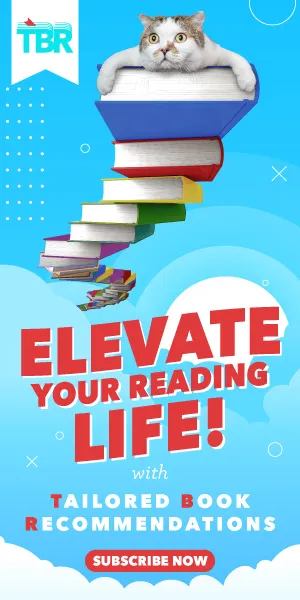
20 Must-Read Fiction and Nonfiction Books about the Disability Experience
As a disabled writer myself, I think there isn’t a singular disability experience. These books are as diverse as their authors, and each person has a unique perspective on their own disabilities. Even people with the same disabilities have vastly different opinions and experiences. I’m always interested in reading other disabled writers. While there are great science fiction and fantasy books by disabled authors, I want to focus this list on fiction and nonfiction that explores disability in a more realistic way.
Many of these books include specific trigger warnings; for example, substance abuse disorder, intimate and systemic violence, suicide, surgeries and other medical decisions, or episodes of psychosis. For several reasons, disability literature may contain words considered slurs today. Some of these were once medical terms and are presented in their historical context. Disabled authors may also reclaim slurs or depict incidents of ableism verbatim. Many books by disabled authors creatively blur format, incorporating visual art, diary entries, medical records, or literary analysis.
Some authors directly acknowledge their privilege in their books, which might include access to education or expensive treatments. For disabled people from the United States, the Individuals with Disabilities Education Act (IDEA) and the Americans with Disabilities Act (ADA) allowed us to access school and other aspects of public life for the first time. Some of these authors remember these civil rights laws being passed or offer opinions on ways they could be updated.
Awards and Literary Journals
There are several awards and literary journals which highlight disabled writers and their work. These include The Barbellion Prize, a British literary prize for disabled authors open to international entrants. Here in the U.S., the Schneider Family Book Award honors kids’ and YA books depicting disability.
Literary magazines by and for disabled authors and editors include Deaf Poets Society, Kaleidoscope, and Wordgathering. I’m proud that all three of these magazines have published some of my work, but I don’t have any financial stakes in them. To make them more accessible, Wordgathering and Deaf Poets Society have posted audio recordings of written pieces since at least 2016.
Nonfiction
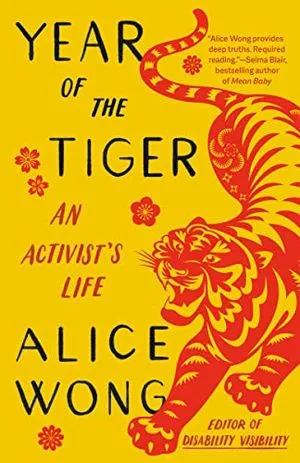
Year of the Tiger: An Activist’s Life By Alice Wong
Alice Wong was born in 1974, the Year of the Tiger in the Chinese Zodiac. Her memoir was published in another Year of the Tiger, 2022. In the introduction, she describes herself as “a mutant from planet Cripton,” tying her sense of humor together with her lifelong love of science fiction and fantasy. She especially loves the diverse worlds of Star Trek and X-Men. Born in Indiana to Chinese immigrant parents, Wong moved to California for grad school, where she found more accessibility and a larger Asian American community. In June 2023, she played a cartoon, fictionalized character of herself on Netflix’s series Human Resources.
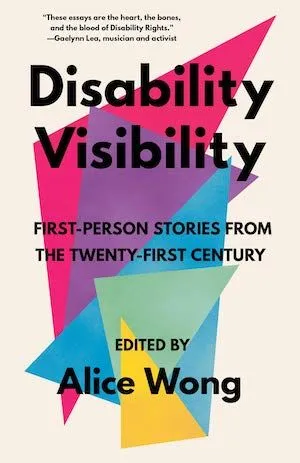
Disability Visibility: First-Person Stories from the Twenty-First Century edited by Alice Wong
This excellent anthology from a diverse group of disabled contributors, includes essays on guide dogs, balancing religious obligations with a disability, and the marginalization of Indigenous people in predominantly white disability spaces. The book centers on topics that are still stigmatized or not discussed often, even in disabled communities, such as asexuality, incontinence, brain injury, and cognitive disabilities. Alice Wong founded the Disability Visibility Project. Its blog and podcast collect disabled people’s written and oral narratives.
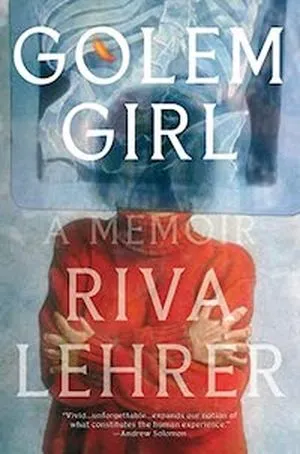
Golem Girl by Riva Lehrer
Lehrer, an activist and visual artist, begins her memoir with etymologies of the word “monster.” As a child with spina bifida, she related to Frankenstein’s monster in movie adaptations. Her book’s title comes from the myth of the golem, created by a rabbi to protect his congregation from persecution. The title ties together her identity as both Jewish and disabled. Her mother was a nurse at Cincinnati Children’s Hospital, who advocated for her surgeries and medications. Lehrer attended a school for disabled students in the 1960s, before access to public school in the U.S. for disabled students was legally protected. As an adult, she worked as a college art instructor and painted portraits of fellow activists.
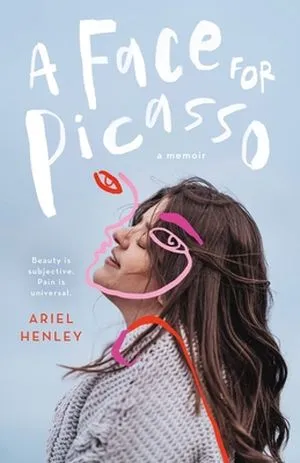
A Face for Picasso by Ariel Henley
The author and her twin sister, Zan, were born with Crouzon syndrome, a craniofacial condition, and had several life-saving surgeries as children. The title comes from a profile of the twins as children, in which a journalist wrote, “Their faces resembled the work of Picasso.” Henley became fascinated with Picasso’s art and biography. The memoir discusses Western beauty standards and their emphasis on proportions and symmetry, marginalizing people with facial differences. It also follows Henley’s childhood in California and becoming more independent by attending college in Vermont.
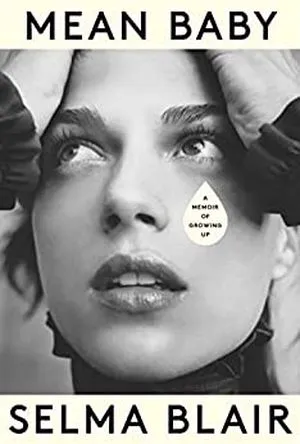
Mean Baby by Selma Blair
The title “mean baby” reflects how adults impose narratives on children, who are too young to regulate their emotions. Blair has had a successful acting career since the 1990s, including the movies Cruel Intentions and Legally Blonde. In 2018, she was diagnosed with multiple sclerosis. In 2019, she walked down the red carpet at the Oscars using a customized cane, a moment that was meaningful to many fellow disabled people. Her 2022 memoir covers her childhood, career, and diagnosis.
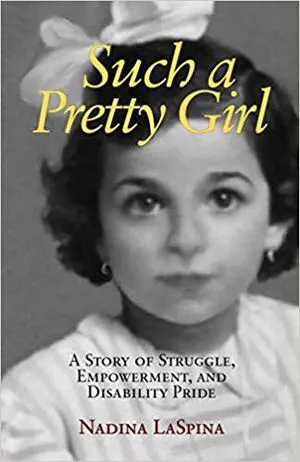
Such a Pretty Girl by Nadina LaSpina
Nadina LaSpina was born in Sicily in 1948 and contracted polio as a child. Around age 13, she and her family immigrated to the U.S. At an NYC hospital after surgery, she wore a body cast for almost a year. She also used a wheelchair and made friends with disabilities for the first time. Like many other disabled authors, she found both experiences freeing. As an adult, she participated in protests with many fellow disabled activists, which led to the passage of the ADA and its precursor, Section 504.
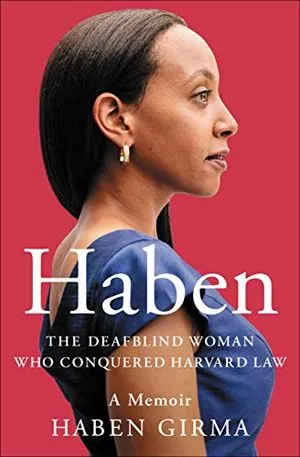
Haben: The Deafblind Woman Who Conquered Harvard Law by Haben Girma
Disability rights advocate and lawyer Haben Girma wrote in the introduction to her memoir: “Communities designed with just one kind of person in mind isolate those of us defying their narrow definition of personhood.” She was born in California to Eritrean immigrant parents. In 2013, she became the first Deafblind graduate of Harvard Law School. She describes working with her guide dog, communicating with assistive technology, and volunteering to help build schools in Mali.
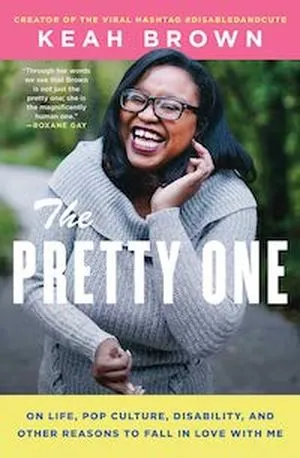
The Pretty One by Keah Brown
This essay collection is a brilliant combination of personal reflection and pop culture analysis. Brown explains growing up with cerebral palsy and her relationships with her twin sister and close friends. She analyzes her pop culture favorites while acknowledging how racism and ableism negatively impacted her self-image. She’s also published fiction books: Sam’s Super Seats is a picture book illustrated by Sharee Miller and The Secret Summer Promise is a queer YA romance. Both books have young, Black protagonists with cerebral palsy.
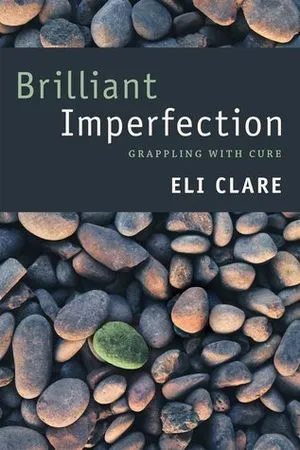
Brilliant Imperfection: Grappling with Cure by Eli Clare
Cure is a complicated, fraught subject in the disabled community. Each person has a different perspective on it. This book explores the related concepts of personhood, bodily autonomy, and consent, which systemic oppression often denies marginalized people. This book provides historical context on the intersection of racism, anti-LGBTQIA hate, and ableism. Examples include the ableist and racist history of circus sideshows and the abuse of Ota Benga, a Mbuti man abducted and displayed in the Bronx Zoo against his will in 1906.
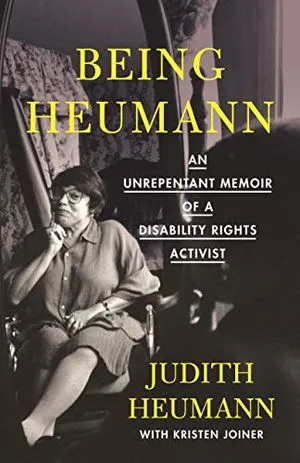
Being Heumann: An Unrepentant Memoir of a Disability Rights Activist by Judith Heumann with Kristen Joiner
Judith Heumann was a lifelong activist. Her parents — both orphaned by the Holocaust — defied a doctor’s suggestion to institutionalize her. Her parents advocated for her to access school. At Camp Jened, later profiled in the documentary Crip Camp, Huemann honed her skills as an organizer and met many other future activists. In 1970, she sued the state of New York and became its first teacher who used a wheelchair. Her protests contributed to the passage of Section 504 in the 1970s and the ADA in 1990. She died in 2023 at age 75. Being Heumann and Disability Visibility, mentioned earlier, have also both been adapted into versions for young readers.

Sick: A Memoir by Porochista Khakpour
Born in Tehran, Iran, Porochista Khakpour is a novelist and essayist. In her memoir, she describes moving across the U.S. and trying supplements and frustrating treatments on the long journey to her late-stage Lyme disease diagnosis. She also experienced misdiagnosis, medical racism, and sexism. She describes feeling alienated from her own body: “To find a home in my body is to tell a story that doesn’t exist.”
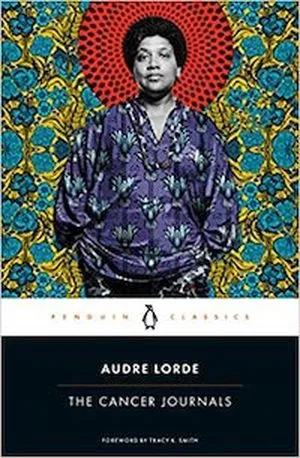
The Cancer Journals by Audre Lorde
In 1980, Lorde, an activist, poet, and professor, published her account of surviving breast cancer. The book combines poetry and personal essays with her journal entries. It explores how her diagnosis affected her identity as a Black, feminist, lesbian woman. Bodily autonomy is an important theme; for example, she discusses her personal decision not to wear a breast prosthesis after a mastectomy. Many later examples of feminist and disability literature would also explore these themes.
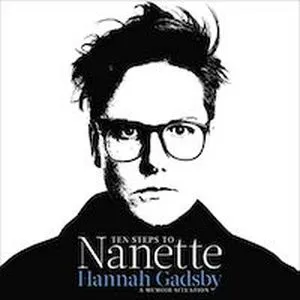
Ten Steps to Nanette: A Memoir Situation by Hannah Gadsby
Like many other authors on this list, Gadsby describes writing a memoir as a way of regaining control over their own narrative. The queer, autistic, Australian comedian is a versatile, award-winning performer known for their Netflix comedy specials and visual art shows. They mix dry, self-deprecating humor and social critiques of systemic anti-LGBTQIA bias, sexism, and ableism. Gadsby describes the toll autistic masking took on them, especially as a teen.

The Collected Schizophrenias by Esmé Weijun Wang
This essay collection incorporates diagnostic criteria, the author’s emails to her doctors, and personal reflections. Her primary psychiatric diagnosis is schizoaffective disorder, bipolar type, but as the title suggests, diagnoses can overlap or change. She acknowledges that some people find diagnoses unnecessary, but for her, they are a reminder she’s not alone. Schizophrenia has been particularly stigmatized throughout history and described as evil, witchcraft, or possession. In her essay “Yale Will Not Save You,” Wang describes being pushed out of Yale due to her mental illnesses in the early 2000s. Colleges often treat disabled students as liabilities instead of accommodating them under the ADA. This is especially true of mental illnesses.
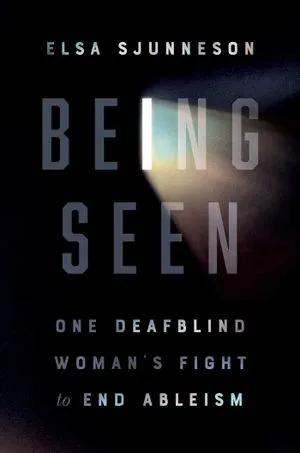
Being Seen: One Deafblind Woman’s Fight to End Ableism by Elsa Sjunneson
Sjunneson is an educator and speculative fiction author and editor. Her debut memoir analyzes ableism in pop culture and how inaccurate and stereotypical portrayals affect how Deafblind people are treated in everyday life. At her former favorite bar, a bartender calls her guide dog a “pet” and tries to force them both to leave, in violation of the ADA. She writes that this civil rights law from 1990 should be updated. For example, it should apply to online accessibility and be easier to enforce.
Fiction

Accidents of Nature by Harriet McBryde Johnson
Johnson, who died in 2008, was a legendary disabled attorney and activist. After philosopher Peter Singer said parents should have the legal right to euthanize their disabled infants, she debated him in person. Her 2006 YA novel’s protagonist, Jean, a teen with cerebral palsy in 1970, has always tried to fit in with her non-disabled classmates. When she attends a camp for disabled kids, she becomes part of a disabled community for the first time. Sara, a longtime camper, introduces Jean to the basics of the disability rights movement. Sara’s “telethon to stamp out normalcy” is an incisive satire of fundraisers that pity disabled kids. Yet Jean also feels that Sara manipulated her fellow campers into acting out her own ideas.
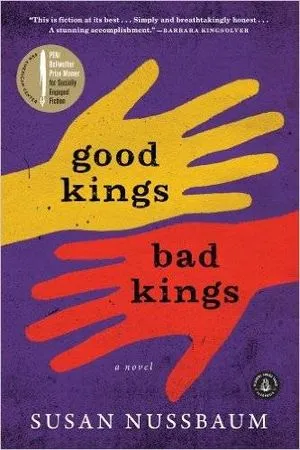
Good Kings Bad Kings by Susan Nussbaum
This novel follows a group of employees and young residents at a nursing home in Illinois. The characters are diverse, both racially and in their disabilities, and each has a distinct narrative voice and storyline. Joanne, an employee who was paralyzed as an adult, relates to the residents and introduces them to disability history and activism. Overcrowding and under-staffing enable abuse and death. The residents realize they can protest their corrupt, abusive institution. This novel won the 2012 PEN/Bellwether Prize for Socially Engaged Fiction. The author was also a playwright who reworked her best-unproduced play into this novel.
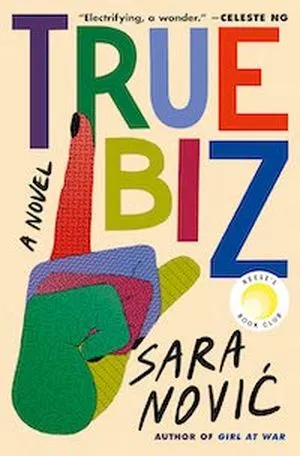
True Biz by Sara Nović
Set in a boarding school for Deaf students, this novel’s characters include Charlie, a new student, and February, an alumna and headmistress trying to save the school. It also contains lots of background on Deaf culture and illustrations of American Sign Language. Some of the students, like Austin, come from Deaf, signing families, while Charlie comes from a hearing family. Growing up without access to sign language was socially isolating for Charlie. Her story also shows that many Deaf people don’t want cochlear implants. In Charlie’s case, her implants are dangerous. She crews for a school production of Peter Pan and joins a diverse, rebellious group of friends.
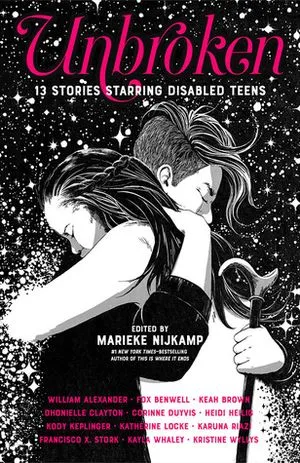
Unbroken: 13 Stories Starring Disabled Teens edited by Marieke Nijkamp
This 2018 YA anthology is diverse in the styles and subjects of the stories and the authors’ and characters’ identities. The stories range from science fiction and fantasy worlds to realistic, contemporary stories about dating. These are dynamic characters, whose relationships with other characters — and with their own disabilities — are complex and sometimes change.

Breathe and Count Back from Ten by Natalia Sylvester
The title of this YA novel has a possible double meaning: taking a deep breath before anesthesia or before swimming. Veró, the protagonist, is a Peruvian American teen girl with hip dysplasia, who wants to work as a performer at a mermaid-themed amusement park. She also has a crush on her neighbor. For disabled kids, scheduling surgeries can be daunting and completely disrupt school and other plans. This novel shows that surgeries, ableist harassment, first love, and first jobs have a huge impact on teens.
More Books on Disability
We also love these books by disabled poets and books about disability history. I still consider all these books from my 2019 BR article must-reads too.




